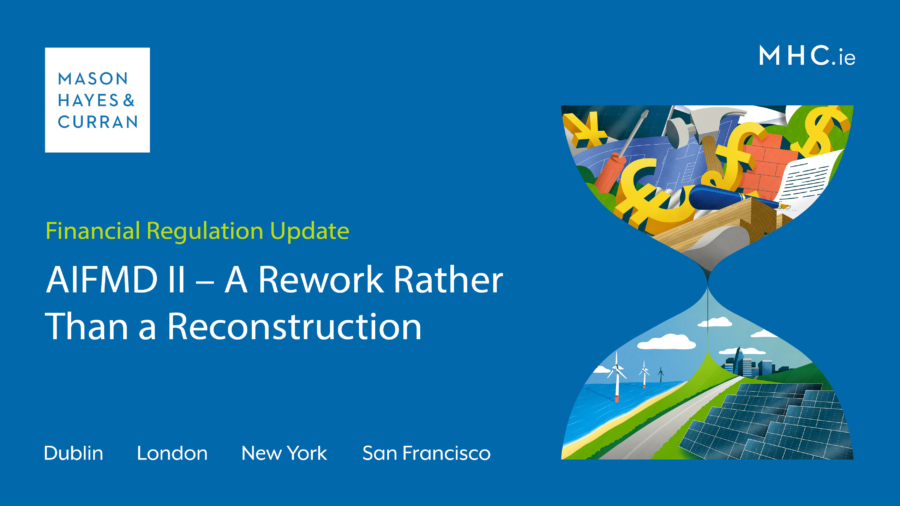
The requirements for the operation of Alternative Investment Fund Managers in Europe have been the subject of intense negotiations. European legislative bodies have tried to reach an agreement on the changes required to the alternative investment funds landscape. With the recent publication of the final text of AIFMD II, our Investment Funds team highlights the most important incoming changes for this sector.
The text of the Directive amending the EU Alternative Investment Fund Managers Directive (AIFMD II) was published in November 2023. AIFMD II will affect the management and marketing of Alternative Investment Funds (AIFs) in the European Economic Area. In this article, we identify five key aspects of AIFMD II which fund management companies (FMCs) and funds should be aware of.
Delegation framework
AIFMD II attempts to address the delegation framework for alternative investment fund managers (AIFMs), while also maintaining the flexibility of current delegation structures. While some EU states and the European Securities and Markets Authority (ESMA) have raised concerns about risk oversight, no new delegation restrictions are anticipated. However, FMCs face heightened reporting requirements on delegation arrangements.
Under AIFMD II, FMCs will be required to:
- Disclose delegate details
- Describe resources used for portfolio and risk management
- Specify delegated functions, and
- Outline due diligence measures
Enhanced reporting will occur during authorisation and as part of regular regulatory reporting. There will also be new reporting obligations for EU AIFMs managing third-party AIFs, including providing additional conflict of interest information to competent authorities, potentially impacting the third-party AIFM model. EU AIFMs will also need to furnish regulators with comprehensive details on delegated tasks, resources, and due diligence measures.
Liquidity risk management
Under AIFMD II, EU AIFMs will be required to choose at least two additional Liquidity Management Tools (LMTs) from a prescribed list, including options such as:
- Redemption gates
- Extended notice periods
- Redemption fees
- Swing pricing
- Anti-dilution levies
- Redemptions in kind
Money-market fund managers are required to select only one LMT. The chosen tools must align with the AIF's investment strategy, liquidity profile, and redemption policy.
EU AIFMs will be obliged to establish detailed policies and procedures for LMT activation and deactivation, along with operational arrangements. Notifications to competent authorities about selected LMTs, associated policies, and any activations or deactivations are mandatory. Investors will also receive specific information about LMTs under AIFMD II.
In exceptional circumstances, EU AIFMs managing open-ended AIFs will have the temporary authority to:
- Suspend unit or share repurchases or redemptions
- Activate or deactivate selected LMTs, or
- Implement side pockets
Loan origination funds
One of the areas AIFMD II has focused on most and which was the subject of heavy negotiations is loan originating funds (LOFs).
The changes to loan origination funds set out under AIFMD II include:
- Risk retention – LOFs will be required to retain an economic interest of 5% of the notional loan value and be held for specific periods.
Reporting and disclosures
The reporting obligations under Article 24 of AIFMD have been extended with the requirement for an AIFM to report on all markets, instruments and exposures, and assets of each AIF that it manages, rather than the principal markets, instruments and exposures. There is also a requirement to report the total amount of leverage employed by the AIF along with information on the delegation arrangements regarding portfolio or risk management functions. EU AIFMs will also need to report each Member State where units of the AIF are being marketed. The Article 23 AIFMD investor pre-contractual exposures have also been expanded.
Depositaries
Depositaries will no longer be required to be established in the same Member State as the relevant EU AIF. Subject to certain criteria, an EU AIFM may engage a depositary based in another Member State. Unfortunately, this does not mean the introduction of a ‘depositary passport’ for depositaries as may have been hoped for.
Conclusion
In the end, and after a drawn-out series of sometimes contentious negotiations, the changes to AIFMD are relatively limited in scope aside from those related to loan origination. AIFMD II does not seek to overhaul the entirety of AIFMD but instead has sought to make targeted amendments to particular areas under AIFMD. Subject to formal approval by the European Parliament and the Council of the European Union, it is expected that the measures will come into effect in 2026.
While most of the changes will apply to full-scope EU AIFMs, there will be certain requirements applicable to non-EU AIFMs such as Article 23 disclosures and Annex IV reporting when marketing AIFs under National Private Placement Regimes. There is no confirmation as yet that the UK is planning to make similar changes to the UK requirements for AIFMs however a consultation in 2024 has been suggested to implement some measures.
For more information on how the changes to AIFMD will impact your organisation, please get in touch with a member of our Investment Funds team.
The content of this article is provided for information purposes only and does not constitute legal or other advice.
Share this:





